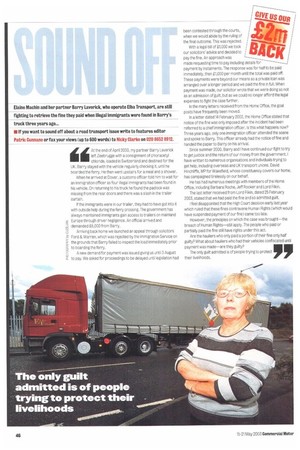Elaine Machin and her partner Barry Laverick, who operate Elba
Page 46

If you've noticed an error in this article please click here to report it so we can fix it.
Transport, are still fighting to retrieve the fine they paid when illegal Immigrants were found in Barry's truck three years ago...
• If you want to sound off about a road transport Issue write to features editor Patric Cunnane or fax your views (up to 600 words) to Micky Clarke on 020 8662 8912.
d At the end of April 2000, my partner Barry Laverick
left Zeebrugge with a consignment of chloracetyl chloride, loaded in Switzerland and destined for the UK. Barry stayed with the vehicle regularly checking it, until he boarded the ferry. He then went upstairs for a meal and a shower.
When he arrived at Dover, a customs officer told him to wait for an immigration officer as four illegal immigrants had been found in his vehicle. On returning to his truck he found the padlock was missing from the rear doors and there was a slash in the trailer curtain.
If the immigrants were in our trailer, they had to have got into it with outside help during the ferry crossing. The government has always maintained immigrants gain access to trailers on mainland Europe through driver negligence. An official arrived and demanded £8,000 from Barry.
Arriving back home we launched an appeal through solicitors Ford & Warren, which was rejected by the Immigration Service on the grounds that Barry failed to inspect the load immediately prior to boarding the ferry.
A new demand for payment was issued giving us until 3 August to pay. We asked for proceedings to be delayed until legislation had been contested through the courts, when we would abide by the ruling of the final outcome. This was rejected.
With a legal bill of £1,000 we took our solicitors advice and decided to pay the fine, An approach was made requesting time to pay including details for payment by instalments. The response was for half to be paid immediately, then £1,000 per month until the total was paid off. These payments were beyond our means so a private loan was arranged over a longer period and we paid the fine in full. When payment was made, our solicitor wrote that we were doing so not as an admission of guilt, but as we could no longer afford the legal expenses to fight the case further.
In the many letters received from the Home Office, the goal posts have frequently been moved.
In a letter dated 14 February 2002, the Home Office stated that notice of the fine was only imposed after the incident had been referred to a chief immigration officer. Is this what happens now? Three years ago, only one immigration officer attended the scene and spoke to Barry. This officer already had the notice of fine and handed the paper to Barry on his arrival.
Since summer 2000, Barry and I have continued our fight to try to get justice and the return of our money from the government. I have written to numerous organisations and individuals trying to get help, including overseas and UK transport unions. David Hinchliffe, MP for Wakefield, whose constituency covers our home, has campaigned tirelessly on our behalf.
He has had numerous meetings wtth members of the Home Office, including Barbara Roche, Jeff Rooker and Lord Filkin.
The last letter received from Lord Filkin, dated 25 February 2003, stated that we had paid the fine and so admitted guilt.
I feel disappointed that the High Court decision early last year which ruled that these fines contravene Human Rights (which would have suspended payment of our fine) came too late.
However, the principles on which the case was brought—the breach of Human Rights—still apply. The people who paid or partially paid the fine still have rights under this act.
Are the hauliers who only paid a portion of their fine only half guilty? What about hauliers who had their vehicles confiscated until payment was made—are they guilty?
The only guilt admitted is of people trying to protect their livelihoods.




























































































































































